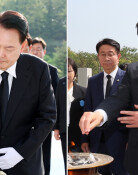Inter-Korean road project depending on the North's denuke efforts
Inter-Korean road project depending on the North's denuke efforts
Posted November. 26, 2018 07:31,
Updated November. 26, 2018 07:31
The United Nations Security Council has granted an exemption to sanctions against North Korea to allow the two Koreas conduct a joint field survey on North Korean railroad sections for an inter-Korean project connecting roads and railways. The United States has also allowed the exemption. There have been exemptions for people-to-people exchanges or events, but this is the first time that an exemption was granted for a cooperative project. South Korea’s presidential office welcomed the green light, saying that it was meaningful that the project gained “recognition and support from the United States and the international community.” Lim Jong-seok, presidential chief of staff, said that South Korean people would be able to go to Beijing by train for the 2022 Winter Olympics.
It took as many as seven months for the two Koreas to be allowed to kickstart a joint survey for a project to modernize North Korea’s railways and roads and reconnect them with the South as stated in the Panmunjom Declaration of April 27. This must have served as an opportunity to realize how strict and watertight the sanctions are. The South Korean government had earlier claimed that a joint survey was not subject to sanctions. However, controversies arose over the required transfer of fuel and equipment to the North violating U.N. sanctions, and the U.N. Command had also blocked a plan by refusing to grant permission to travel across the military demarcation line (MDL).
The Seoul government is apparently welcoming the exemption finally permitted following twists and turns. The presidential office has mentioned the possibility of President Moon Jae-in and Chairman Kim Jong Un’s attendance at a groundbreaking ceremony, which was agreed by the two sides in September to be held within this year, and also expressed expectations for the project to be completed by early 2022 when Moon’s term comes to an end. The government even said that a groundbreaking ceremony can be held without sanctions exemption as it is a “symbolic event.” However, it is doubtful whether a groundbreaking event is necessary for a project whose proceedings remain uncertain. Even if the survey and tape-cutting ceremony will be held, the two Koreas cannot move further without the easing of sanctions corresponding to steps towards denuclearization.
The Moon administration initially expected that the inter-Korean project could be granted an exemption as a whole on the grounds that improved inter-Korean relations can lead the denuclearization drive. This is why the government had called for sanctions relief despite the international community’s disapproval. Yet, Seoul’s strategy did not work. The latest exemption is also applied only on the joint survey. The two Koreas’ railways and roads will be connected depending on the North’s efforts to denuclearize and the international community’s actions in return. We have a long way to go, and now is hardly the time to consider running at full speed.







